 It is a morning of meetings again. First, Saed takes us to the stunning new campus of An-Najah University (http://www.najah.edu/)- the largest university in Palestine, home to 15000 students- more than half of them women.
It is a morning of meetings again. First, Saed takes us to the stunning new campus of An-Najah University (http://www.najah.edu/)- the largest university in Palestine, home to 15000 students- more than half of them women.The university has always been a beacon of resistance to the occupation, and Israeli forces have never been able to enter the campus. Unsurprisingly, they have labelled it 'the terrorist university'. The university has had the land for the new campus since 1970 but the Israelis prevented any building work until 2000, when construction finally started. Recently, the students' union of the University of Manchester twinned with An-Najah, much to the dismay of the Zionist lobby.
First, we are received by Dr Husni Maqbool, Dean of the Faculty of Medicine. He starts by explaining how the Israelis did nothing to improve the Palestinian healthcare system under occupation. The Palestinian Authority has been trying to improve matters- still, at best, the system here is a 'filter' which is forced to refer complex cases to Israeli and Jordanian hospitals. (The Israelis charge the Palestinian Authority for this 'service'- even though under international law they bear responsibility for the health of people under their occupation.)
Dr Maqbool told us that students and staff are often delayed or even prevented from making it to lectures at checkpoints. An-Najah does not have a university hospital of its own; this is in the pipeline. Meanwhile, students obtain training in the city hospitals. For many specialties, the only centre where training is available is Maqassed in Jerusalem. However, students from the West Bank need a special permit to enter Jerusalem- this is almost impossible to obtain. He also narrated the case of a cardiologist of Palestinian origin who trained in the US and was appointed to An-Najah. He arrived on a tourist visa, but was denied a work permit by the Israelis and was ultimately forced to leave.
The medical school has 35-40 students in each year. The selection process is rigorous; it is a combination of high school scores, a test and an interview. This year's interviews were held two days before our visit- 102 students with high school scores of more than 97% turned up. Dr Maqbool told me that they were all appointable; but, at the moment, An-Najah's finances simply cannot accommodate any more medical students. As a result, most aspiring doctors are denied their chosen career, unless their families are wealthy enough to send them abroad.
Did you know that the Palestinian literacy rate is 91%? Also, they have one of the highest proportions of university graduates in the world. Imagine what they could achieve if they were free of occupation. So much for the Western stereotype of Palestinians as backward, hot-headed extremists.
We next meet Dr Nabil Alawi, the Director of Public Relations for An-Najah. He reminds us that Nablus is still under siege and has been for seven years. The Israelis even control the water supply- this runs only once a week. Needless to say, the illegal Jewish settlements have fountains and swimming pools.
He commends our presence here as a symbol of defiance. He says that Palestinians feel abandoned by the world, but visits such as ours give them some reassurance that they haven't been forgotten.
The economic situation in Nablus means that two-thirds of students have to take out loans. Their academic performance is adversely impacted by the fact that journeys of barely 20 km can take up to 4 hours. He narrated an incident from 2004 when he and the Speaker of the House were stopped by the Israelis at Huwwara checkpoint. They were ordered to walk into the middle of the road and undress. This was in full view of 2000 female students who were stuck at the checkpoint. When the men disrobed, all the students looked away- to the intense annoyance of the soldiers.
We are on our way out when we bump into the Dean of the Faculty of Nursing who insists that we sit down for a cup of tea with her. She fled Palestine for Sweden many years ago and was not allowed back in until she obtained Swedish citizenship- she is now here on a visitor's visa!
The next stop is Rafidia Hospital, the main general hospital in Nablus. We are met by Dr Sadaqah, the Deputy Director. He tells us that each time the Israelis invade Nablus, the first thing they do is to encircle the hospital, preventing the passage of staff and patients and resulting in unnecessary deaths. Sometimes patients need to be transferred to hospitals in Jerusalem or Israel- however the Israeli authorities create hurdles at every opportunity. Often by the time permission is obtained (a minimum of 2 days even for an emergency), the patient dies- this happened to a burns patient two days before our visit.
At the height of the 2002-2003 invasions and curfews, Rafidia received 8-9 cases of serious injuries every day. Staff ended up living in the hospital for 23 days. The Israeli army prevented casualties from the Old City from going to Rafidia- a clinic was set up in a mosque in the Old City to deal with them. Dr Sadaqah told us that this clinic had to perform two emergency amputations without anaesthesia. The Israelis would also prevent bodies from being taken for burial- as a result the hospital morgue overflowed and ice-cream trucks had to be used to store the bodies.
He also told us that the Israelis would regularly enter the hospital, and actually removed 4 patients from their beds. One of these was actually an intensive care patient who had just returned from major surgery. When the doctors and nurses asked for reasons, they were simply pushed aside. We were horrified to learn that when the soldiers removed patients from the hospital, they were accompanied by Israeli doctors who never tried to stop this happening. The soldiers would often remove patients from ambulances while they 'checked' them.
Dr Sadaqah then takes me on a tour of the hospital. We visit the 4-bedded ICU. In 2002-2003, patients ended up being ventilated with rudimentary operation theatre machines- often on the floor and in the kitchen of ICU.
On one of the wards I meet a young man called Ayman Tayseer. He was walking in the mountains near an Israeli settlement when he picked up a metal object. This was actually ordnance left by Israeli soldiers. It exploded, blowing his right hand off. I ask him if he has anything to say to the camera; he says, "don't pick up strange objects".
Our next stop is Balata, the biggest refugee camp in the West Bank. We are received at the children's Yafa Cultural Centre by Tayseer Nasrallah, its chairman. The name 'Yafa' is significant as the majority of families here were uprooted from the Jaffa (Yafa) area in 1948.
Balata has always been a symbol of defiance against the occupation. In the year 2001, it was the first area to be put under siege by the Israelis- this was in an attempt to break the nucleus of the resistance, which they believed to be in Balata. There are still regular invasions, in fact we are told that there was one the previous night. To move from house to house, the Israelis blast their way through walls, without warning the families on the other side. Random firing upon civilians is the norm. We are told the story of an MP living in Balata whom the Israelis came to arrest- even though he had only one room, they destroyed the whole building. They also assassinated several of his family members.
Tayseer wonders why the world is silent on this daily state terrorism committed by Israel, while demanding perfect behaviour from the Palestinians. The media goes to town about suicide bombings by Palestinians, but when was the last one? Why is it that when an Israeli life is lost, it is front-page news, with pictures of the victim and interviews with the grieving relatives; whereas when a Palestinian is killed, the news is tucked away in a corner- no names are given, just something along the lines of 'a Palestinian died today.....'?
We are then taken round the camp. I have never seen anywhere so crowded. I thought Deheisheh was cramped, but in Balata 24000 people are crammed into 1 square kilometre. That translates into an area of 10 square metres per capita- that includes toilet/washing space. Whereas Israelis get 3200 square metres per capita.
 Some of the alleyways between the houses are so narrow that even the thinnest person in our group has to turn his whole body sideways to walk down them. Saed tells us that when sick people have to be taken to ambulances, they have to be passed from roof to roof. 'When Israel celebrates 60 years of independence, this is what these people celebrate,' he says bitterly.
Some of the alleyways between the houses are so narrow that even the thinnest person in our group has to turn his whole body sideways to walk down them. Saed tells us that when sick people have to be taken to ambulances, they have to be passed from roof to roof. 'When Israel celebrates 60 years of independence, this is what these people celebrate,' he says bitterly.There isn't a single street corner or lamppost which isn't riddled with bullet marks. We enter the camp's graveyard- there are rows upon rows of graves of young people here. The cemetery is in direct view of a special Israeli military post on the hill opposite. Recently 5 resistance fighters sitting in the graveyard were killed by shelling from this post.
The Israelis will insist that they come into Balata to root out the 'terrorists'. However, the reality is somewhat different. Try the case of 7-year-old Khaled Walweel. On 27 March 2004, he was looking out of his window when he got shot in the neck. His uncle carried him down the street to an ambulance, but an Israeli jeep tried to prevent him from doing so. When he finally reached the ambulance, the jeep tried to prevent it from leaving the camp. By the time he finally reached hospital he was dead. (See picture in right-hand margin)
Khaled's case is just one of several. Visit http://www.balatacamp.net/ for many such stories. Faced with the daily violence of the Israeli military machine, I am not surprised that some residents have taken up arms to defend the camp. They have every right to do so. I refuse to call them terrorists- they are resistance fighters. It is not as if they are going into the cities to kill and maim civilians.
The terrorists are those who invade the camp every night to kill and injure innocent people and demolish their houses. Yet the world continues to turn a blind eye.
It has been a sobering day. After a brief rest, we meet in a pizzeria which does the most amazing grilled chicken sandwiches and beefburgers we have ever eaten. The owner could teach the Americans a thing or two about their own food!
We walk back to the hotel with Saed. It is past eleven and the streets are quiet. We pass the Nablus Football Club and the owner, who knows Saed (by the way, Saed knows everyone) insists that we stop for tea. Inside the club are displayed various trophies won at tournaments. One of the walls is also plastered with pictures of dead footballers- all killed in the prime of their youth by the Israeli army.
We sit outside the club on stools, sipping the most delicious sage tea. About a dozen tough-looking young men in t-shirts and jeans appear. They huddle shyly in a group a few metres away from us. 'These are the tough kids of the neighbourhood,' Saed tells us. 'But they have good hearts. They have all lost fathers, brothers and friends. They have come to welcome you because you are friends of Palestine'. We nod at them respectfully.
Someone reports that the Israelis are about to invade a camp tonight. We have to leave abruptly. We walk through the city- it is completely deserted. Some children wave at us from their balcony above. Although the streets are eerily quiet, we feel safe in Saed's company. When we reach the hotel, we feel a sense of accomplishment- we have just walked through Nablus in the dead of the night!
I go to work on the blog again. The gunfire tonight is louder than yesterday. The tanks will be rolling in, but the people in the camps will be resisting- as they do every night.
Goodnight Nablus. I salute your spirit.


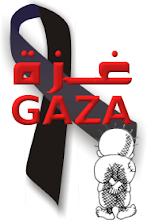
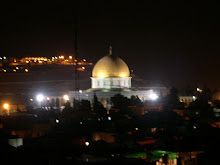
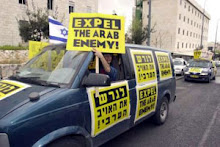




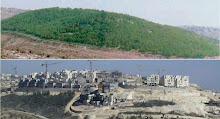



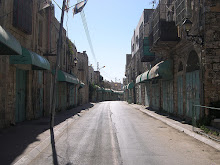
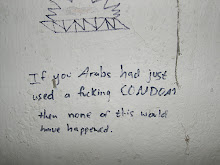
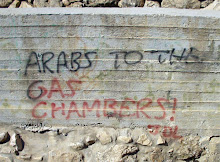

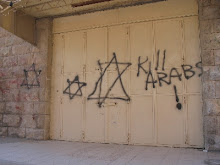
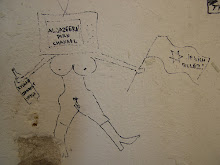
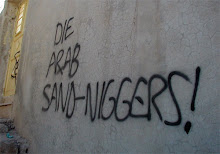
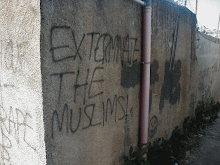
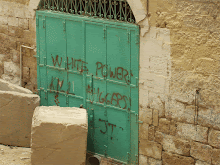



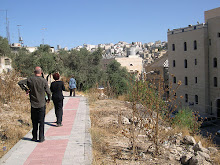

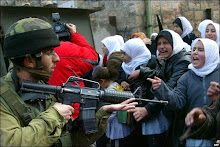
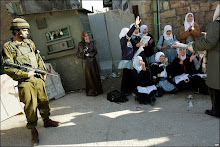
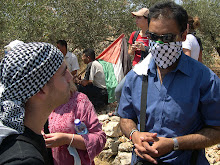
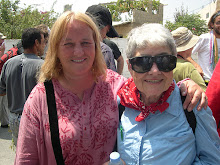
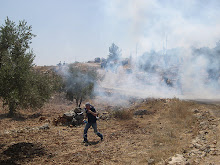
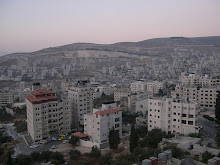

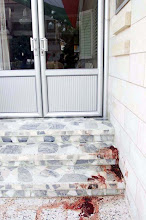








3 comments:
Dear A,
Thanks for sending the link to your blog - it's great. I'm only about half-way through so far -there's so much of it; I'm not surprised you were knackered when you got back - but I've learned loads already. You all did so much in the couple of weeks you were here. And I'm so glad you all got out of Ben Gurion unscathed!
Thanks again.
Dear A
Today morning I got a link of your blog and have been reading nonstop since.
Want to thank you for the effort.
It was a horrible days, The Intifada started when I was 18 years old, my last year in school, it was so hard to get to schools everyday, we used to face all the hard times to success and continue our studies, i though since then to start working on many projects, internet projects to support Palestine, but at the moment I didn't have any special things till we started on the 2004 our first online store that supports the made in Palestine products Palestine shop, on the year 2006 continued to open our second Palestinian onine shop Palshirts, on the year 2010 we opened the handmade most popular Palestinian shirts Palestineshirts.
My bestreagrds from Palestine :)
Post a Comment